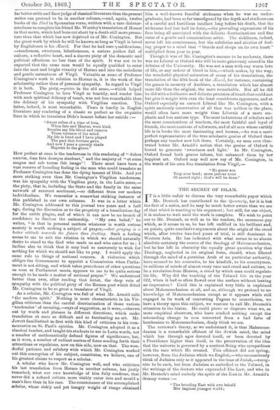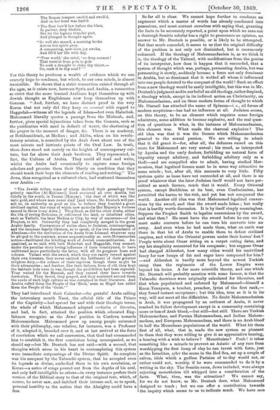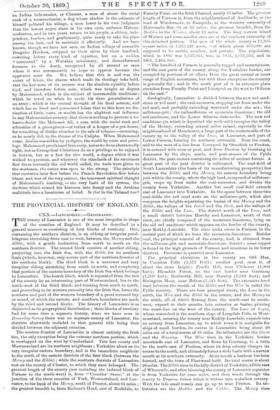THE SECRET OF ISLAM.
IT is a little unfair to discuss the very remarkable paper which Mr. Deutsch has contributed to the Quarterly, for it is but the first of a series, and he may be much better aware than we are of that which is wanting to his argument ; but still, for our object, it is useless to wait until the work is complete. We wish to point out to Mr. Deutsch, as well as to his readers, the enormous gap which, as it seems to us, he has left unfilled in his brilliant and, on points, quite conclusive arguments about the origin of the creed which, after twelve hundred years of trial, is still dominant in Western Asia. He has indicated with what seems to us almost absolute certainty the source of the theology of Mahommedanism, but he has left in obscurity the equally great question why that Theology, neglected in its original form, should, when filtered through the mind of a pUtrician Arab of no particular authority, have seemed to his comrades, to his kinsfolk, to his countrymen, to millions of minds of almost every race and creed and culture, to be a revelation from Heaven, a creed by which man could regulate his life. Why did the teaching of the Talmud bite in the year 622, when it had so often flowed over the surface without leaving an impression ? Until this is explained very little is explained about Mahommedanism at all, and as, although we pretend to no knowledge of Mahommedanism except as it appears while still engaged in its work of converting Pagans to monotheism, we have a theory upon this subject, we venture to call Mr. Deutsch's attention to the hiatus. He could prove or disprove what we, as mere empirical observers, who have studied nothing except the astounding change in men converted from a bad form of heathenism to Mahommedanism, dimly think we see.
The reviewer's theory, as we understand it, is that Mahomme- danism is a remarkable offshoot of the Jewish mind, the mind which has through ages devoted itself, or been devoted by a Providence higher than itself, to the preservation of the idea that the universe is governed by a sentient Being who sympathises with the race which He created. This offshoot did not spring, however, from the Judaism which we English,—who unconsciously think of Judaism only as it appeared in the time of Josiah,—recog- nize to be such, but from Judaism as embodied in the Talmud, in the writings of the doctors who expounded The Law, and who in Mr. Deutsch's mind embody the spirit of the East in Mr. Arnold's dreamy verses :—
" The brooding East with awe beheld Her impious younger world ;
The Roman tempest swell'd and swell'd, And on her head was hurl'd.
"The East bow'd low before the blast, In patient, deep disdain. She let the legions thunder past, And plunged in thought again.
"So well she mused, a morning broke Across her spirit grey.
A conquering, new-born joy awoke, And fill'd her life with day.
"'Poor world,' she cried, 'so deep accurst! That rnnn'st from polo to pole To seek a draught to slake thy thirst,— Go, seek it in thy soul?' "
For this theory he produces a wealth of evidence which we can scarcely hope to condense, but which, to our own minds, is almost irresistible. He shows that a strict connection existed through all the ages, as it exists now, between Syria and Arabia, a connection so strict that the more learned Arabians kept themselves up with Jewish thought as Englishmen now keep themselves up with German. " And, further, we have distinct proof in the very Koran that not only did they keep an courant with regard to Haggadah—witness all the legends of Islam—but even Halachab. Mahommed literally quotes a passage from the Mishnah, and, further, gives special injunctions taken from the Gemara, such as the purification with sand in default of water, the shortening of the prayer in the moment of danger, &c. There is an academy, or Bethhamidrash, at Medina ; and Akiba, when on his revolu- tionary mission, is consulted by the Arab Jews about one of the most minute and intricate points of the Oral Law. In truth, these Jews stood not merely on the heights of contemporary cul- ture, but far above their Arab brethren. They represented, in fact, the Culture of Arabia. They could all read and write, whilst the Arabs had occasionally to capture some foreign scholars and promise them their liberty on condition that they should teach their boys the elements of reading and writing." The Jews, thus recognized as a cultured class, had scattered themselves over Arabia :— " The Jewish tribes, some of whom derived their genealogy from priestly families (Al-Kabinani), lived scattered all over Arabia, but chiefly in the south, in Yemen (Himyar), 'the dust of which was like unto gold, and where men never died' [and where, Mr. Deutsch will per- mit us, on authority as good as his, to believe they founded a great civilized capital, the ruins of which now underlie Her Majesty's fortress named in fierce irony Aden.] They lived, as did the other Arabs, either the life of roving Bedouins, or cultivated the land, or inhabited cities, such as Yathrib, the later Medina or City, by way of eminence—of the Prophet, to wit. Outwardly they had completely merged in the great Arabic family. Conversions of entire clans to Judaism, intermarriages, and the immense family-likeness, so to speak, of the two descendants of Abraham—for the derivation of the Arabs from Ishmael, whatever may be alleged to the contrary, seems unquestionably an ante-Mohammedan notion—facilitated the levelling work of Jewish cosmopolitanism. Ac- quainted, as we said, with both Halachalt and Haggadah, they seemed, under the peculiar story-loving influence of their countrymen, to have cultivated more particularly the latter, with all its gorgeous hues and colours. Valiant with the sword, which they not rarely turned against their own kinsmen, they never omitted the fulfilment of their greatest religious duty,—the release of their captives, though these might be their adversaries ; and further, like their fathers, from of old, thoy kept the Sabbath holy even in war, though the prohibition had been repealed. They waited for the Messiah, and they turned their faces towards Jerusalem. They fasted, they prayed, and they scattered around them the seeds of such high culture as was contained in their literature. And Arabia called them the People of the ' Book,' even as Hegel has called them the People of the Geist.'"
They had introduced their Calendar—the grateful Arabs calling the intercalary month Nassi, the official title of the Prince of the Captivity—had spread far and wide their theologic terms, the whole of which Mahommed adopted verbatim et literatim, and bad, in fact, attained the position which educated Eng- lishmen recognize as the Jews' position in Cordova towards Mahommedans. Mahommed grew up among people saturated with their philosophy, one relative, for instance, was a Professor of it, adopted it, brooded over it, and at last arrived at the form of conviction which we call conversion, that God had commanded him to establish it, the first conviction being accompanied, as we should say—but Mr. Deutsch has not said—with a second, that thoughts which arose in his heart in contemplating this system were immediate outpourings of the Divine Spirit. So complete was his conquest by the Talmudic system, that he accepted even its legends as divine, embodied them in his own revelation, or Koran—a series of songs poured out from the depths of his soul, and only half-intelligible to others—in every instance prefers their version of the Biblical story to that of the original text, which, of course, he never saw, and imbibed their intense and, so to speak, personal hostility to the notion that the Almighty could have a Son.
So far all is clear. We cannot hope further to condense an argument which a master of words has already condensed into pemmican, and must content ourselves with saying that, granting the facts to be accurately reported, a point upon which no man not a thorough Semitic scholar has a right to pronounce an opinion, no answer to Mr. Deutsch is possible, or is likely to be attempted. But that much conceded, it seems to us that the original difficulty of the problem is not only not diminished, but is enormously enhanced. If the theology of Mahommedanism is, as we think it is, the theology of the Talmud, with modifications from the genius of its interpreter, how does it happen that it succeeded, that a system of thought which was, perhaps, permeating Arabia, but was permeating it slowly, suddenly became a force not only dominant in Arabia, but so dominant that it welded all whom it influenced into one people devoted to the conquest of the world ? Such an effect from a new theology would be easily intelligible, but this was in Mr. Deutsch's judgment and in our belief an old theology, rather despised, a theology which, except in its indirect action on Christianity, on Mahommedanism, and on those modern forms of thought to which Mr. Disraeli has attached the name of Spinoza—i. e., all forms of modern scepticism—has had no influence at all. Judaism seems, on this theory, to be an element which requires some foreign admixture, some addition to become explosive, and the real ques- tion of questions is what, in the instance of Mahommedanism, this element was. What made the charcoal explosive ? The old idea was that it was the licence which Mahommedanism granted to the sexual passion. We are willing to admit that it did grant it—for, after all, the defences raised on this score for Mahommed are very unreal ; his creed, as interpreted by Ayesha and the early doctors, forbidding no natural form of impurity except adultery, and forbidding adultery only as a theft—and are compelled also to admit, having studied Mor- monism, that legalized licence must be in some way attractive to some minds ; but, after all, this amounts to very little. Fifty systems quite as loose have not succeeded at all, and there is no proof whatever that the later Judaism itself would not have per- mitted as much licence, much that it would. Every Orientat system, except Buddhism at its best, even Confucianism, has permitted the harem to the rich, and yet has not conquered the- world. Another old idea was that Mahommed legalized conver- sions by the sword, and that the sword made Islam ; but really that is hardly worth discussion. It is by itself simply meaningless. Suppose the Prophet Smith to legalize conversions by the sword,. and what then? He must have the sword before he can use it,. must make converts before he can turn his converts into au- army. And even when he had made them, what on earth was- there in that lot of Arabs to enable them to defeat civilized empires, and wither the Oriental powers under their horses' feet People write about Omar sitting on a carpet eating dates, and say his simplicity accounted for his conquests ; but suppose Omar- had charged Aldershot, how many cities would his uncivilized fancy for raw lumps of fat and sugar have conquered for him? —and Aldershot is hardly more beyond the newest Turkish camp than the regiments of the Lower Empire were beyond his levies. A far more scientific theory, and one which Mr. Deutsch will probably mention with some favour, is that the- Talmudic doctrines were originally calculated for Shemites, and that when popularized and enforced by Mahommed—himself a Knox-Tennyson, a teacher, preacher, lyrist of the first rank,— they found instant acceptance ; but this idea, true as it is in its way, will not meet all the difficulties. No doubt Mahommedanism is Arab, it was propagated by an outburst of Arabs, it never reached its fullest development except in a community containing more or less of Arab blood,—but still—but still. There are Turkish Mahommedans, and Persian Mahommedans, and Indian Mahom- medans, and European Mahommedans, and there is no Arab blood' in half the Mussulman populations of the world. What bit them first of all, what, that is, made the new system so pleasant to them that they were willing to give it an appreciative hearing, a hearing with a wish to believe ? Monotheism? Pooh I it takes something like a miracle to prevent an Asiatic of any race from worshipping the first lump of clay he can invest with form, just as the Israelites, after the scene in the Red Sea, set up a couple of calves, idols which a godless Parisian of to-day would not, or rather could not, worship if he were commanded to do it by a writing in the sky. The Semitic races, Jews included, were always rejecting monotheism till whipped into a consideration of the facts. What, then, was the attraction? We cannot say, for we do not know, as Mr. Deutsch does, what Mahommed designed to teach ; but we can offer a contribution towards the inquiry which seems to us to indicate much. We have seen
an Indian hide-stealer, or Chamar, a man of about the social rank of a resurrectionist, a dog whose shadow in the estimate of bimself polluted his village, a man lower in his own judgment than the lowest negro slave in his own eyes, embrace Mahom- medanism, and in two years return to his people, a citizen, inde- pendent, fearless, and gentlemanly, quite ready to take his place among the best, and to maintain it efficiently. And we have known, though we have not seen, an Indian village of cowardly Bengalee Hindoos, stripped to their skins by their landlord, cowering before every kind of injustice, but on a sudden " converted " by a Wahabee missionary, and thenceforward freemen to the death, recognized by all around as men whom it was unreasonable to hope to oppress because the oppressor must die. We believe that this is and was the secret of Islam, the charm which made its theology take hold, that the key-note of its success was the absolute equality before God, and therefore before man, which was taught as dogma by Mahommed, which is the subject of innumerable traditions ; which be acted on when he made his slave generalissimo of an army ; which is the central thought of his final sermon, and which has so lived and permeated Islam that to this hour no dis- tinction of birth, caste, or wealth has the slightest real influence in any Mahommedan country, that there is nothing to prevent a to- bacco-dealer like Mehemet Ali, a man with the social rank and education of a greengrocer—or rather of a keeper of a pot-house, for something of dislike attaches to the sale of tobacco—mounting, as he nearly did, to the throne of the Caliphs. When Mahommed came, Arabia was ridden by pedigree, the world by caste and privi- lege. Mahommed proclaimed fraternity, notas we do as abstractedly right, not as Evangelical Christians do as a privilege to be enjoyed in heaven, but as a fact for this world, a dogma which it was wicked to question, and wherever the standards of his successors flew there instantly the old world ended, the tools were given to the workmen, the career was open to the strong. The principle that centuries later flew before the French Revolution flew before Omar, and was of the very essence, the innermost spiritual thought of Mahommed's teaching, — the very basis of his system, the doctrine which roused his kinsmen into frenzy and the Arabian multitude into a fanaticism of belief. Is that in the Talmud too?
































 Previous page
Previous page